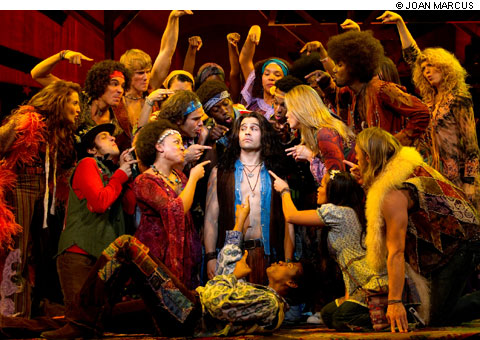
LOST INNOCENCE Forty-four years later, Hair still has the power to shock — if not surprise. |
At the close of the second act of last Thursday's performance of Hair, as the cast disrobed, an audience member began yelling loud enough to be heard over the mawkish ensemble number, "Where Do I Go." "This is fucking ridiculous!" she screamed. When the house lights came up, she stomped out of the theater, swearing all the way. Her antics occasioned endless speculation in the unfathomably long line for the ladies' room — did that woman even know what kind of musical this was?At 44 years old, Hair (at the Colonial Theatre through April 8) retains the power to shock. But the touring Broadway production, directed by Diane Paulus, rarely surprised me. Some clever staging, like the sequence lit entirely by the actors' flashlights, was exciting, and so was the talent of the cast. But by and large, the production stayed faithful to the well-worn conventions of America's favorite tribal love-rock musical: the nudity, the bell-bottoms, the simulated doobie toking.
Not that I'm complaining: Hair is my favorite. In high school — Catholic, mind you — my friends and I would gather around Rick Bertone's keyboard in his parents' tiny living room and sing our favorite Hair songs (we were partial to "Be-In" and "Black Boys"), or run through the entire original-cast recording, which Ricky had on vinyl.
One summer, the Pacific Musical Theater brought Hair to Chicago. I still remember the thrill of seeing a bunch of college kids get naked and pretend to be stoned. To us, the show wasn't an anti-war invective or a paean to collectivism; it was a promise of the sex we could have and the drugs we could take once we got to college and could finally stop wearing those stupid uniforms.
For all the simulated sex of Karole Armitage's choreography, Paulus's production retained some of the adorable naïveté of suburban Catholic theater dorks singing "Sodomy." The cast, staring with exaggerated plaintiveness into the middle distance, seemed eerily toned and well scrubbed. Even from a dozen rows back, I could count the abs on the shaven torsos of the male leads. As he cavorted up and down my aisle, I caught a whiff of Berger, who's played by the improbably named Steel Burkhardt; he smelled like deodorant.
The musical numbers were similarly crisp. From the built-in set at the back of the stage, the band played arrangements of the Galt MacDermot score that, for the most part, sounded like those on the original-cast recording. "Donna" and "Going Down" retained the irreverent ebullience of my farthest-flung fantasies; they couldn't have been better. "Ain't Got No" and "I Got Life" sounded the best they have since the passing of Nina Simone.
But that crispness worked against the music when the arrangements tried to get too funky. One reason for the original-cast recording's continuing transcendence is a certain primness of vocals and instrumentation. The women who sing on it — if not actual hippies, close enough — frequently sound as demure as Petula Clark. That's lost in a production filled with clean-cut females compelled to infuse everything with a throaty sensuality.